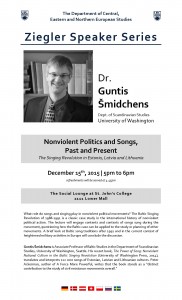What role do songs and singing play in nonviolent political movements? The Baltic Singing Revolution of 1988-1991 is a classic case study in the international history of nonviolent political action. The lecture will engage contents and contexts of songs sung during the movement, questioning how the Baltic case can be applied to the study or planning of other movements. A brief look at Baltic song traditions after 1991 and in the current context of heightened military activities in Europe will conclude the discussion.
Guntis Šmidchens is Associate Professor of Baltic Studies in the Department of Scandinavian Studies, University of Washington, Seattle. His recent book, The Power of Song: Nonviolent National Culture in the Baltic Singing Revolution (University of Washington Press, 2014), translates and interprets 112 core songs of Estonian, Latvian and Lithuanian cultures. Peter Ackerman, author of A Force More Powerful, writes that the book stands as a “distinct contribution to the study of civil resistance movements overall.”
